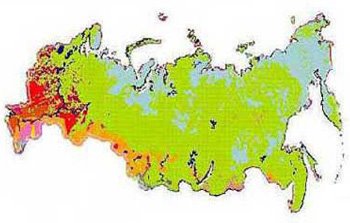
Intensivity of Russian agriculture as of 2006. Red and pink areas are intensively used (though not necessarily producing maximum yields). Orange areas have large-scale farming, but little investment in machinery and fertilizers. Blue is occupied by reindeer production. Green is classed as "unused." Note that this map does not take into consideration areas under heavy forestation that may be more effectively used for timber rather than agriculture. Graph source: IIASA
Reuters | 6 June 2009
- Russia pledges to double grain exports
- Medvedev says world needs balanced grain supply, demand
- Excessive protectionism damaging to growth
- Biofuels should be produced from non-food resources
By Aleksandras Budrys and Amie Ferris-Rotman
ST PETERSBURG, Russia, June 6 (Reuters) - Russia, seeking a greater say in global food issues, pledged on Saturday to double grain exports and urged suppliers to unite in eliminating food price surges in a world where every sixth person is starving. President Dmitry Medvedev proposed closer coordination between grain exporters, including a possible Black Sea grouping, and said excessive protectionism had encouraged speculation in global grain markets.
"Every five seconds a child dies from hunger on this planet. The world, to a large degree, is more concerned with its income and profit. This is immoral," Medvedev said as he launched the Kremlin's showcase World Grain Forum.
Russia, propelled into the top three global wheat exporters by a record crop last year, has almost one-tenth of the world's arable land and plans to increase grain production by about 50 percent in the next 15 years.
Already the world's largest energy producer and a major supplier of commodities to global markets, Russia wants to play a central role in governing agricultural trade flows.
"We are preparing to strengthen our position on the world grain market and to put financial and organisational support behind it," said Medvedev, who first proposed the forum during a meeting last July with leaders of the Group of Eight.
"We should work out a mechanism that can regulate supply and demand imbalances on the world grain market," he said.
"Excessive protectionism is damaging for sustainable development, including in the agricultural sector, though it is flourishing and often leads to speculation on the grain market."
Grain prices hit record highs in 2008 when investment funds flocked to a bull run in commodities. Although prices have since retreated, the rising global population and frequent droughts have raised the spectre of supply shortages and higher prices.
"Today, the number of people starving in the world has reached 1 billion," Medvedev said. "Every sixth person on our planet is starving."
GRAIN FOR FOOD, NOT BIOFUELS
Medvedev told an international audience of more than a thousand officials and executives that Russia, the world's No. 2 oil exporter, would only support the development of environmentally friendly biofuels that used non-food resources.
"The technology now exists and we think the world community has to find a compromise between the issues of energy and food security," he said. "The growth of biofuels should not become a reason for a growing deficit of food grain."
Agriculture Minister Yelena Skrynnik said Russia would be able to produce up to 135 million tonnes of grain within 10 to 15 years, compared with 90 million planned for this year, by cultivating land now lying fallow and increasing crop yields.
"This will be enough to cover domestic needs and to export 45 million to 50 million tonnes," she said. Russia expects to ship about 20 million tonnes of grain in the current crop year.
International executives urged Russia to maximise its potential by encouraging more private investment and opening up more land to foreign investors.
The European Bank for Reconstruction and Development said at least 13 million hectares of former farmland could be returned to production across ex-Soviet countries, half of it in Russia.
"The investments remain enormous. Under the current circumstances such financing is difficult to obtain," EBRD President Thomas Mirow told Medvedev at the meeting. (Writing by Robin Paxton, editing by Tim Pearce)













